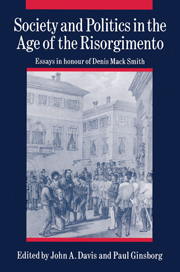Book contents
- Frontmatter
- Contents
- List of figures and maps
- List of contributors
- Preface
- Map 1 Italy in 1815
- Map 2 Italy in 1870
- Map 3 Italy – place names
- 1 1799: the Santafede and the crisis of the ancien régime in southern Italy
- 2 War and society in Napoleonic Italy: the armies of the Kingdom of Italy at home and abroad
- 3 The poor and how to relieve them: the Restoration debate on poverty in Italy and Europe
- 4 Bandits, violence and the organization of power in Sicily in the early nineteenth century
- 5 Marriage and the family in Italy in the early nineteenth century
- 6 After the Revolution: bandits on the plains of the Po 1848–54
- 7 Labouring women in northern and central Italy in the nineteenth century
- 8 Garibaldi in England: the politics of Italian enthusiasm
- 9 The middle classes in Liberal Italy
- 10 Francesco De Sanctis: the politics of a literary critic
- Bibliography of Denis Mack Smith's writings on nineteenth-century Italy
- Index
8 - Garibaldi in England: the politics of Italian enthusiasm
Published online by Cambridge University Press: 30 January 2010
- Frontmatter
- Contents
- List of figures and maps
- List of contributors
- Preface
- Map 1 Italy in 1815
- Map 2 Italy in 1870
- Map 3 Italy – place names
- 1 1799: the Santafede and the crisis of the ancien régime in southern Italy
- 2 War and society in Napoleonic Italy: the armies of the Kingdom of Italy at home and abroad
- 3 The poor and how to relieve them: the Restoration debate on poverty in Italy and Europe
- 4 Bandits, violence and the organization of power in Sicily in the early nineteenth century
- 5 Marriage and the family in Italy in the early nineteenth century
- 6 After the Revolution: bandits on the plains of the Po 1848–54
- 7 Labouring women in northern and central Italy in the nineteenth century
- 8 Garibaldi in England: the politics of Italian enthusiasm
- 9 The middle classes in Liberal Italy
- 10 Francesco De Sanctis: the politics of a literary critic
- Bibliography of Denis Mack Smith's writings on nineteenth-century Italy
- Index
Summary
Pre-eminent in the Liberal Calendar of Saints, alongside Oliver Cromwell, George Washington, and Abraham Lincoln, stands Giuseppe Garibaldi. In Italy he was all but deified in his lifetime: some saw him as ‘Christ the Second’, artists depicted him crucified and ascending, and, according to one of his modern biographers, this expressed ‘no more than the feelings of the great mass of the Italian people, especially in the southern provinces’. ‘The People of Italy’, it was said, ’idolize Garibaldi, they have tabooed him, and no one ventures to touch him.’ The nuns of a Palermitan convent, promising to love him and pray to St Rosalia for him, compared him to St George, ‘sweet and beautiful as a seraph’; and a Milanese crowd gasped at his resemblance to St Ambrose. Many relics are preserved and venerated: for example, some of his red shirts, locks of his hair, the bullet that pierced his ankle at the skirmish of Aspromonte in 1862, and the stretcher, stained with blood, on which he was carried wounded from the field.
Italians, with their tradition of hagiolatry, might perhaps be expected to go to extremes in their devotion to their national hero. More surprising was – and is – the adoration of the English, especially as shown during Garibaldi's visit to England in 1864.
- Type
- Chapter
- Information
- Society and Politics in the Age of the RisorgimentoEssays in Honour of Denis Mack Smith, pp. 184 - 216Publisher: Cambridge University PressPrint publication year: 1991
- 9
- Cited by



